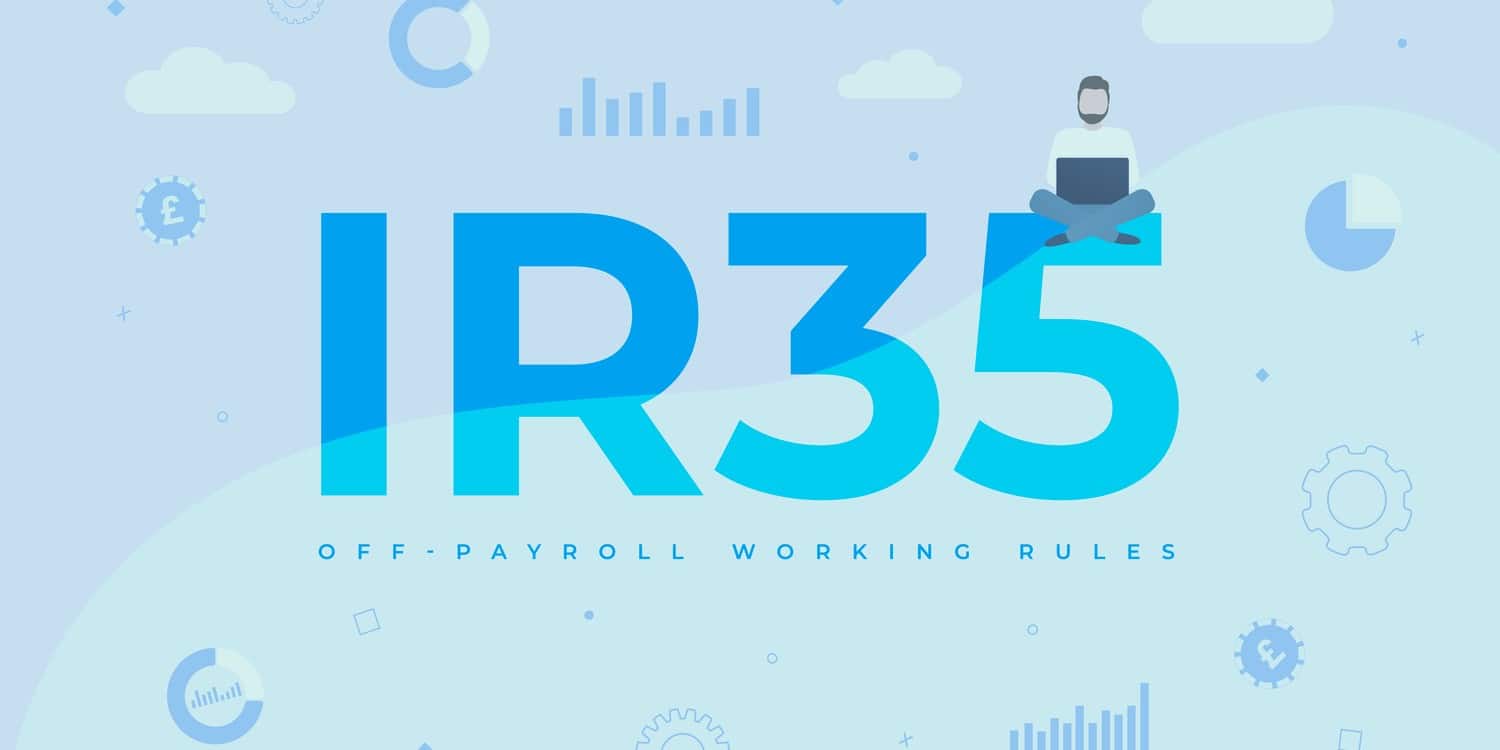If you’re a business owner in the UK, IR35 is one of the most complex tax legislations you’re likely to encounter. But how do these rules impact you?
These rules aim to stop the misuse of contractor limited companies to avoid tax. Non-compliance has led to serious financial penalties for employers and hiring organisations in recent years.
In this article, we break down the laws for both clients and contractors, with actionable steps to help you stay compliant and avoid extra tax bills and fines.
Key takeaways
- IR35 is UK tax legislation designed to combat “disguised employment” by ensuring contractors with limited companies pay similar tax to employees.
- Non-compliance has led to significant financial penalties, so careful compliance is essential.
- For contractors, the impact of IR35 depends on the size of your client. If the client is medium or large, they determine your status. If smaller, you decide it.
- If you are deemed “inside IR35”, meaning you would be an employee if you worked directly rather than through a company, this could result in PAYE deductions at source and a reduction in your take-home pay.
What is IR35?
If you’re a contractor with your own UK limited company or an organisation that hires contractors, you need to consider how the IR35 laws impact you and ensure you’re fully compliant.
IR35 is UK tax legislation that combats “disguised employment” by making sure contractors’ working status is assessed accurately. Disguised employment occurs when someone works like an employee, but operates through a limited company to pay less tax. The law ensures these workers pay broadly the same Income Tax and National Insurance Contributions (NICs) as employees.
- Can I register a company without a UK bank account?
- What is benefit in kind?
- How to value your small business – and why it matters
For example, if a freelance worker with their own limited company only worked for one client most of the time, and that company controlled how and when they did the work, HMRC could deem them to be “inside IR35” because they are working like an employee. They could be liable to pay more Income Tax and NICs than they’d pay through their limited company.
When forming your business and setting up a registered address, it’s vital to think about whether you have the right structure in the context of IR35.
Who is affected?
The Off Payroll Working Rules impact:
- Public sector organisations and medium and large-sized non-public sector organisations that hire contractors through their own companies
- Contractors working in this way
- Recruitment agencies that sit between these clients and workers.
How the IR35 rules have evolved
The IR35 laws were introduced in 2000 and have undergone several reforms since then.
2017 and 2021: Shifting responsibility to clients
Reforms introduced in 2017 for the public sector and 2021 for large and medium-sized private companies shifted responsibility for determining a contractor’s employment status to the client organisation.
Before those dates, the worker was responsible for identifying their own employment status and ensuring they paid the correct tax and NICs.
If the individual is “inside IR35”, the fee payer (usually the client or a recruitment agency) must deduct pay as you earn tax (PAYE) and NICs from the worker’s fee and pay them to HMRC. The fee payer will face penalties for inaccurate IR35 compliance in the same way they would for other taxes.
April 2024: Offsetting double taxation
In April 2024, the rules were amended to address the issue of double taxation for individuals deemed to be inside IR35. If a worker thought they were outside IR35 but HMRC disagreed, the worker might have previously ended up paying tax twice.
The new rules introduced an offset mechanism in which tax already paid counts against the latest income tax and NIC bill.
April 2026: Preventing payroll fraud in umbrella companies
A planned change will aim to prevent fraudulent activities by umbrella companies – intermediaries that employ workers on behalf of fee payers.
This measure will make the fee payers responsible for PAYE and NICs payments to workers supplied via umbrella companies. Many umbrella companies operate diligently, but this change is designed to stop those who facilitate tax avoidance, such as through IR35 abuses.
What is the potential impact for contractors and client companies?
Careful compliance with IR35 responsibilities is essential, as lawyers have reported heavy fines for non-compliance in recent years. Investigations can be lengthy, and indirect costs may include legal fees, reputational damage, and reduced competitiveness in the labour market.
For contractors
If you’re a contractor, the impact of the Off Payroll Working Rules depends on the size of your client. If you work for a smaller company, you are still responsible for determining your status. Doing so inaccurately or without reasonable care could result in bills for unpaid tax, interest, and financial penalties.
For those working for a medium or large company
If you’re working for a medium or large-sized company, it must assess your status and inform you of its decision. If they deem you to be inside IR35, they will treat you like an employee for tax purposes and deduct your income tax and NICs at source. This could result in lower take-home pay due to the potential tax efficiency of working inside a limited company compared to being an employee.
If you are deemed outside IR35, your limited company remains responsible for its own tax affairs. This could result in higher take-home pay.
The rules about size only apply to client companies. All recruitment agencies, regardless of size, are responsible for determining where the Off Payroll Working Rules apply.
Does IR35 apply to your client business? A quick compliance guide
The Off Payroll Working Rules apply to your company if:
- You receive services from a contractor through their limited company or other intermediary, such as a partnership or another individual
- You have a UK connection such as UK residency, permanent establishment
- You are a public sector organisation, or a medium or large private or voluntary sector organisation.
This government flowchart provides additional details on how these criteria are applied.
How to determine IR35 status
Client companies responsible for classifying the status of relevant workers must have a thorough process for this assessment. To reach a determination:
- Identify the person responsible for assessing employment status, such as an HR manager.
- Gather information, review the actual working practices, not just the contract wording.
- Make the determination. Use HMRC guidance and principles established in case law. Consider factors such as:
-
- Whether the contractor controls how and when they work
- Can they substitute their services with an equally skilled person
- Whether both parties can choose not to offer or accept work, known as mutuality of obligation. You can also use the government’s Check Employment Status for Tax tool. HMRC stands by the outputs from this tool, provided the inputs are accurate and you’ve followed the guidance correctly.
Finally, issue a status determination statement (SDS) – a document that explains your findings and is given to the contractor and any agencies involved. Do this before the role is advertised so that candidates understand their status.
This process requires meticulous record-keeping. A Full Company Secretary Service from an agent such as Quality Company Formations can help you manage your crucial legal documents efficiently.
Example: Sarah, the software developer
A large technology business hires Sarah through her limited company for a six-month project. Sarah receives a set of tasks and deadlines, but decides how and when to work, as long as she meets the project milestones.
The contract states Sarah can send an equally skilled substitute to complete the work, with the client’s reasonable agreement, known as a substitution right.
The technology business is not obliged to offer Sarah more work after the contract, and Sarah does not need to accept any more work. This is known as mutual obligation.
Based on these factors, the client issues an SDS stating Sarah is outside IR35, meaning she must handle her own tax and business affairs.
Does IR35 apply to sole traders?
IR35 does not strictly apply to sole traders as they are self-employed individuals who do not operate through a limited company.
However, fee payers responsible for assessing contractor status must still ensure the individual is genuinely self-employed to avoid being deemed a disguised employee.
As with contractors, the defining criteria include factors such as control over the work, right to substitute, and mutual obligation.
What if a worker disagrees with an IR35 decision?
If you’re a client company deciding, you must have a disagreement process in place. If a contractor disagrees with an SDS, they have the right to challenge it verbally or in writing. Your hiring managers should be aware of how to support them through the disagreement process.
You must, as a minimum:
- Consider the representations made by the person raising the disagreement
- Leave that worker’s tax treatment unchanged while you consider the challenge
- Respond within 45 calendar days from the date you receive the disagreement, showing your considerations.
If the original status is unchanged, you must inform the disagreeing party, providing reasons. If the status has changed, state that you are withdrawing the previous determination, and give a new SDS to all relevant parties with an effective date.
If you don’t respond within 45 days, you’ll become the deemed employer for PAYE purposes. This means you will be responsible for any tax and NICs due until you respond.
Umbrella companies can simplify your IR35 issues
If you’re a contractor who is potentially working inside IR35, it can be a challenge to figure out who is responsible for ensuring compliance with the rules and for paying the income tax and NICs.
You can avoid many of these issues by working through an umbrella company. This acts as an employer for contractors, handling your payroll and treating you like a regular employee to ensure compliance. It should mean you don’t have to worry about the complexities of the legislation and associated administration.
A client checklist for IR35 compliance
- Confirm your size based on the definitions in the Companies Act. If you’re a medium or large company, establish a process for identifying the IR35 status of each relevant worker.
- Review your engagements with every contractor working through a limited company.
- Make determinations and issue SDSs to each of these workers. Ensure every conclusion is documented with clear reasoning and communicated to the contractor and any agency involved.
- Implement a process for handling disagreements and commit to responding within 45 days.
- Use the government Check Employment Status for Tax tool to help support your determinations.
- Maintain records. Keep all contracts, working practice agreements, SDSs and appeals.
Take early action to safeguard your competitive edge
Aligning with these rules requires diligence, transparency, and accurate record-keeping. Taking proactive steps towards compliance gives you a competitive advantage by demonstrating your commitment to clear and professional practice.
Thinking of setting up a company? Explore how Quality Company Formations can help you take that first step and stay compliant year-round.












Join The Discussion